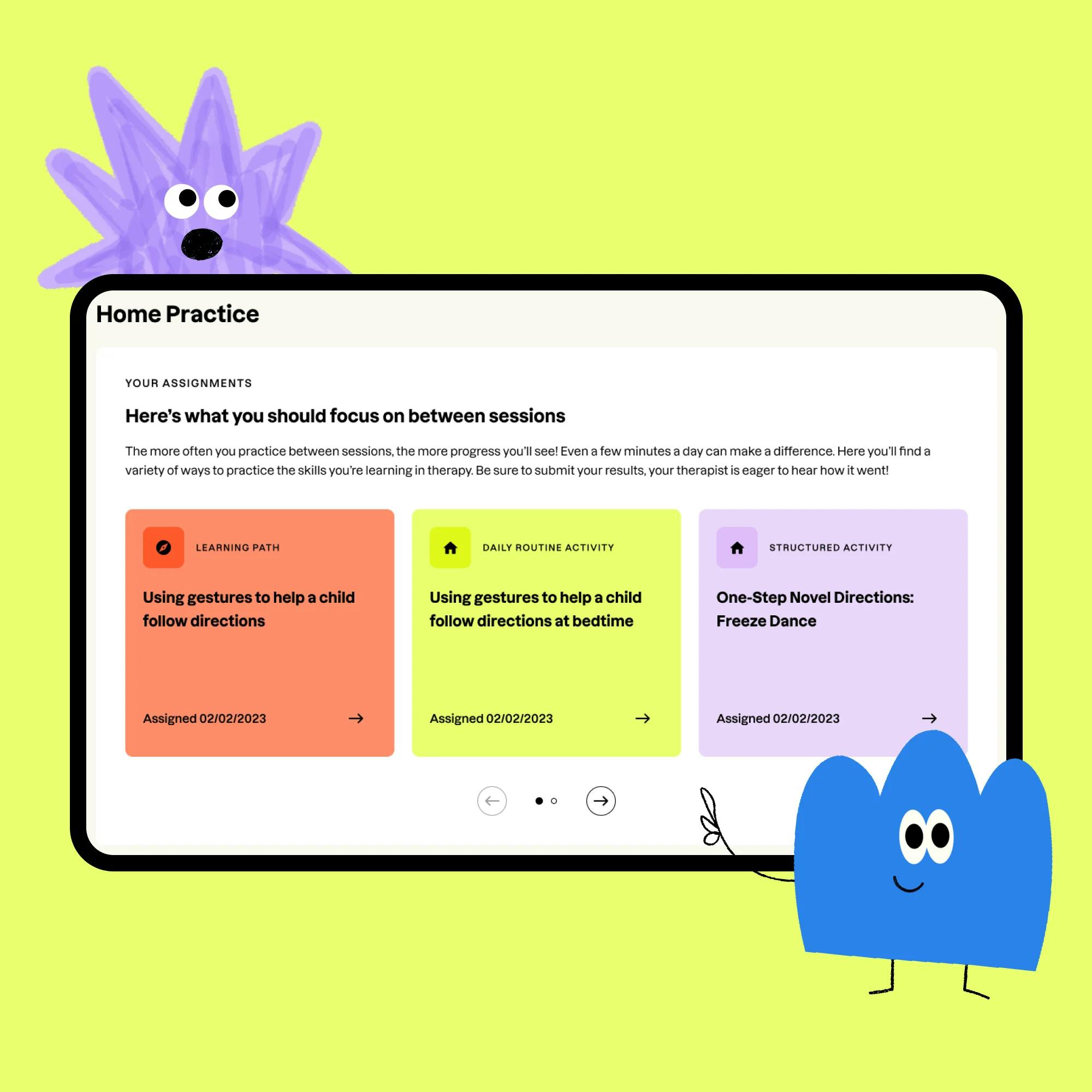
From Surgery to Speech Therapy: Overcoming Speech Challenges After a Cycling Accident
 Abby Barnes, M.S., CCC-SLP
Abby Barnes, M.S., CCC-SLP
Imagine going out for a simple bike ride and ending up in surgery, after an accident that not only caused physical trauma, but also affected your ability to speak. That’s what happened to Brian Fitzgerald in 2024.
Brian is an avid cyclist, as well as a sales executive in the technology field. He relies on his ability to communicate, whether he’s giving a presentation or speaking with clients. So when the accident disrupted the clarity of his speech, he was determined to find a way to heal quickly.
In his search for speech therapy, Brian found Expressable and was matched with his therapist, Samantha Campos, M.S., CCC-SLP. After a few months of weekly sessions and dedicated practice at home, Brian was done with speech therapy and back to his everyday life. Here’s how he did it.
Take our free screener
Do you want to improve your communication? Take our online screener and find out if you or a loved one could benefit from speech therapy.
 Start the screener
Start the screenerThe cycling accident and the speech issues that followed
In the fall of 2024, Brian was off-road cycling in his home state of California, a hobby he’s enjoyed for many years. It was after a storm, so he knew to be on the lookout for downed trees and rough terrain. But one tree had fallen on the ground in a way that he couldn’t see. His front wheel hit the tree, which sent him over the handlebars, crashing into the ground and landing facedown.
The trauma occurred to his chin and lower lip, resulting in a concussed nerve. Brian was in surgery for several hours to get everything stitched back together.
As he began to heal, Brian noticed that speech had become a challenge. His articulation wasn’t as clear as it used to be. He specifically had difficulty with the /b/, /f/, /p/, /v/, /t/, and /n/ sounds. Brian jokes that in the tech industry, there are acronyms for everything, and many acronyms use those exact letters. He recalls, “Preproduction Verification Test is one that everyone calls PPVT. I could not say that after my accident. It would come out ‘puh-puh-vuh-vuh-T.’” Not only had speaking become difficult for Brian, but specific topics he needed to discuss at work were extra challenging.


Starting speech therapy: ‘Everything clicked’
Brian began his weekly sessions with Samantha about four weeks after his surgery. He had therapy once a week for four months, a total of 16 sessions. Samantha identified his specific needs and began teaching him techniques help his speech become clearer.
When he started with Expressable, Brian says, “Everything clicked. It clicked so much that it made me feel like it was meant to be.” He says he could immediately tell that the exercises Samantha gave him were exactly what he needed to improve his clarity of speech.
Samantha and Brian focused on daily oral-motor exercises. Samantha explained that scar tissue from the accident was impacting his speech coordination and range of motion, which affected the way he pronounced certain speech sounds.
They worked on exercises in which Brian puffed up his cheeks with air and maintained his lip closure. He also alternated between puckering his lips and smiling in order to improve his coordination and range of motion.
Samantha created personalized word lists to target the phonemes, or speech sounds, Brian found most challenging. He started working on the sounds by themselves, then in syllables, then working up to words, phrases, sentences, and eventually paragraphs--what's known as the articulation hierarchy. He also regularly practiced lip and tongue placement for his target phonemes to support accurate articulation.
Find the right speech therapist for you
We'll match you with a speech therapist who's experienced in your area of need and available when you are.
 Get started
Get startedDedication to home practice makes a difference
Research shows that the more often a person practices new speech skills, the faster they'll make progress. At Expressable, our care model is designed to make that easy. Each client receives customized home practice activities after every session. Our speech therapists assign these exercises through our client portal.
The portal includes Learning Paths to reinforce therapy strategies, demo videos, and practice activities and exercises that easily fit into a person’s daily routine. Clients can also text their therapist between sessions to ask questions and get tips and support.
Brian’s dedication was exceptional. I truly believe his consistent follow-through with homework significantly contributed to his accelerated progress.
Brian made it a point to log into the portal after sessions to review the home practice Samantha had assigned. He downloaded the activities, put them into his iPad or notes page, and made sure to check them off everyday. “I would work 20 to 30 minutes per day. I knew it was super important to do the exercises,” he says. “I had a set time everyday to make sure I got all my exercises done.”
Samantha says, “Brian’s dedication to the home exercise program was exceptional. I truly believe his consistent follow-through with homework significantly contributed to his accelerated progress toward meeting his goals.”


The key to powerful progress in speech therapy
Both Brian and Samantha could see the incredible progress he was making. One moment that stood out to Samantha was when Brian mentioned that his colleagues had said they couldn’t even tell he’d had any speech challenges. It was a true testament to everything they were working on.
By April 2025, Brian was ready to graduate from speech therapy. In leaving an online review for his speech therapist, he knew exactly what he wanted to say. “The review came to me immediately after our last session and just spilled out. After four months of working with Samantha, I was sad for our sessions to end, but immensely pleased with what we had accomplished together.”
Brian’s story is proof that hard work, the right mindset, and a strong therapist-client relationship can lead to quick and powerful progress.
Creatively, Brian wanted to incorporate many of his target sounds from speech therapy in his review–a reference to all the hard work he’d put in over the last four months. His review read: “Thank you Samantha! I'm profoundly pleased and I praise your phenomenal phonetics professionalism. Valiant and visionary, your voice coaching vastly improves vocal versatility–vast thanks to you! Faithfully fostering fluency, your fantastic guidance fuels fearless expression–forever thankful to you!”
Brian proudly notes, “I can still read this with little to no articulation errors!”
While Samantha was proud that Brian was ready to graduate, it was still a bittersweet end. She says, “His enthusiasm and positive attitude made him an absolute pleasure to work with.” She also points out the impact of Brian’s dedication to show up each week and put in the practice at home. Brian’s story is proof that hard work, the right mindset, and a strong therapist-client relationship can lead to quick and powerful progress.


Reach out to Expressable
If you or a loved one is in need of speech therapy, reach out to our talented team here at Expressable. We’ll match you with a licensed speech therapist who can explain your options, perform an evaluation, and help you determine the best next steps. Start our simple sign-up here!
How Expressable Can Help
Concerned your child isn't reaching age-expected milestones? Looking for communication support from a professional? Expressable is a national online speech therapy practice serving children and adults. We treat all major areas of communication and feeding, offer flexible hours including evenings and weekends, and accept most major health insurance plans. We’re proud to have earned more than 3,000 5-star reviews from our clients (4.9/5 average).
Our therapy model is centered on parent and caregiver involvement. Research proves that empowering caregivers to participate in their loved one’s therapy leads to better outcomes. That’s why we combine live, 1-on-1 speech therapy with personalized education and home practice activities for faster progress.
Communication is more than words. It’s how we share how we feel and show who we are. We’re here to help you or your child do just that.











